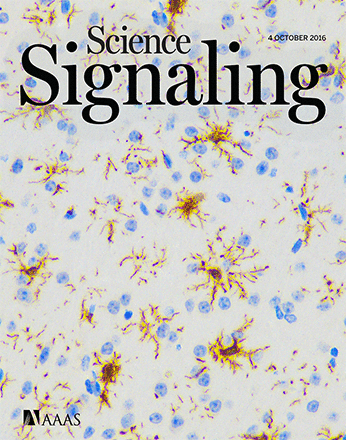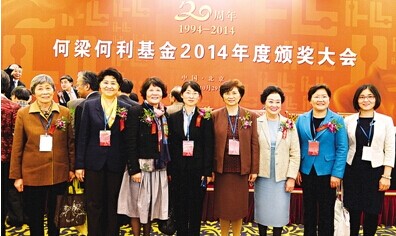2016年10月4日,国际顶尖学术期刊《Science》旗下《Science Signaling》杂志上在线发表了华中农业大学动科动医学院曹胜波教授课题组在乙型脑炎病毒诱导神经炎症反应机制领域的最新研究进展,研究被选为当期封面文章。博士后叶静为论文第一作者,曹胜波教授为论文通讯作者。
乙型脑炎病毒(Japanese encephalitis virus,JEV)是一种经蚊媒传播的人兽共患传染病病原。该病毒与寨卡病毒、西尼罗河病毒同属于黄病毒科,主要侵袭中枢神经系统,不仅可以引起种猪的繁殖障碍,还可导致人的病毒性脑炎。因其死亡率高和常留有神经后遗症,而成为一种危害严重的急性传染病,但目前临床上尚无特效的治疗药物。
曹胜波教授课题组多年来一直专注于JEV免疫与致病机理研究。上述研究利用定量磷酸化蛋白质组学分析发现了JEV感染可导致一系列宿主蛋白磷酸化水平发生显著变化,并揭示了在JEV引起神经炎症反应中发挥重要作用的信号通路及关键蛋白,其中JNK1蛋白的功能尤为突出。在此基础上,利用动物感染模型证明了JNK抑制剂可有效缓解JEV引起的中枢神经系统炎症反应、降低动物的死亡率。上述研究为深入阐明JEV致病机制、发现JEV治疗新靶标、建立基于抑制中枢神经系统炎症反应的病毒性脑炎治疗新方法提供了重要科学依据。

原文链接:
Quantitative phosphoproteomic analysis identifies the critical role of JNK1 in neuroinflammation induced by Japanese encephalitis virus
原文摘要:
Japanese encephalitis virus (JEV) is the leading cause of epidemic encephalitis worldwide. The pathogenesis of JEV is linked to a robust inflammatory response in the central nervous system (CNS). Glial cells are the resident immune cells in the CNS and represent critical effectors of CNS inflammation. To obtain a global overview of signaling events in glial cells during JEV infection, we conducted phosphoproteomics profiling of a JEV-infected glial cell line. We identified 1816 phosphopeptides, corresponding to 1264 proteins, that exhibited a change in phosphorylation status upon JEV infection. Bioinformatics analysis revealed that these proteins were predominantly related to transcription regulation, signal transduction, the cell cycle, and the cytoskeleton. Kinase substrate motif revealed that substrates for c-Jun N-terminal kinase 1 (JNK1) were the most overrepresented, along with evidence of increased AKT1 and protein kinase A (PKA) signaling. Pharmacological inhibition of JNK, AKT, or PKA reduced the inflammatory response of cultured glial cells infected with JEV, as did knockdown of JNK1 or its target JUN. JEV genomic RNA was sufficient to activate JNK1 signaling in cultured glial cells. Of potential clinical relevance, we showed that inhibition of JNK signaling significantly attenuated the production of inflammatory cytokines in the brain and reduced lethality in JEV-infected mice, thereby suggesting that JNK signaling is a potential therapeutic target for the management of Japanese encephalitis.



